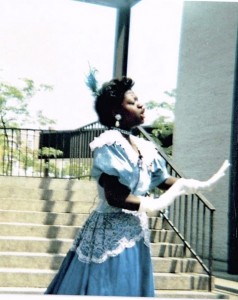by Maureen D. Lee
Born 97 years apart, actress Viola Davis and soprano Sissieretta Jones had similar goals — to perform on stage — one as an actress and one as a singer. Both African American women beat the odds and went on to achieve their dreams. Both women were born in the South: Davis in St. Matthews, South Carolina, and Sissieretta in Portsmouth, Virginia. As youngsters, both moved to Rhode Island (Sissieretta to Providence and Davis to Central Falls) with their families in search of a better life.
Interestingly, Viola Davis once portrayed Sissieretta Jones in 1986 and 20 years later was awarded the 2006 Matilda Sissieretta Jones Award for the Humanities by the Rhode Island Black Heritage Society in recognition of her stage and screen career.
I learned of Davis’s portrayal of Sissieretta from playwright, musician, and retired high school English and drama teacher Tom Maguire of North Kingstown, Rhode Island. He told me about a 20-minute play he wrote for the 350th Anniversary Celebration to commemorate the founding of Providence in 1636 by Roger Williams. The former Rhode Island Hospital Trust Bank sponsored a project called “Portraits of Our Past,” in which several playwrights in the city were asked to develop 15-20 minute plays about important people from the city’s history, such as Roger Williams and entertainer George M. Cohan. On short notice, he was assigned the story of Sissieretta Jones and had two weeks to find out about her and write the play.
With the help of the Providence Public Library (in those days you couldn’t “Google” someone or look them up on “Wikipedia”) he gathered some basic information about Sissieretta and wrote the play, “The Sun is Shining.” The short play, which was performed at libraries, outdoors on the Hospital Trust Plaza, and at a variety of venues in Rhode Island and nearby Massachusetts and Connecticut, had one character — Sissieretta Jones.
Maguire’s play called for Sissieretta, dressed in a beautiful gown, to be seated on a bench in front of her gravestone looking at her scrapbook and recalling her past. He chose this setting even though he knew, from having visited her grave site at Grace Church Cemetery, that she had no head stone. On the stage, to her right, was a concert poster on a stand that said “Black Patti Troubadours, Greatest Colored Show on Earth.” The play had Sissieretta talking about various events in her life and pretending to talk sometimes to her husband, David Richard Jones, and to others. Maguire managed to capture the essence of Sissieretta’s life and her struggles to achieve a singing career despite the dearth of information available to him about the great singer. “There wasn’t much to go on so I had to speculate a lot,” Maguire said.
Once the play was written and a director identified, they had to find an actress to portray Sissieretta. That’s when they hired a recent Rhode Island College graduate, Viola Davis, to play the great soprano. The inexperienced actress really took to the part, even though she didn’t have a strong singing voice, according to Maguire. “She did a real great job.” Maguire said that when she came to the first rehearsal, he asked her to sit down to discuss the play. “She told me she didn’t want to look at it because she had already memorized the script. She really liked it,” he said.
The play about Sissieretta proved to be the most requested of the “Portraits of Our Past” productions and a great chance for Davis to gain more experience. She went on to perform in theater and the movies, and was nominated this year for an Academy Award for best actress in her role as Aibileen Clark in the hit movie, The Help.
Who knows, maybe someday Davis or another talented singer or actress will portray Sissieretta Jones and tell the story of this musical pioneer who sang opera selections, ballads, and European art songs on the concert stage during the first part of her career (1888-1896) and later found a way to continue singing some of this music as the star of the Black Patti Troubadours and Black Patti Musical Comedy Company (1896-1914). Sissieretta, one of the first African American female vocalists to sing at Carnegie Hall and who also performed at the White House, Madison Square Garden, and London’s Covent Garden, was one of the nation’s first African American female vocalists to become an entertainment superstar.
Thanks Tom Maguire for sending me the play, some snapshots of Viola Davis playing Sissieretta, and an audio tape of the play and for allowing me to share your story with those interested in Sissieretta Jones.
For more information about the life of Sissieretta Jones, see Sissieretta Jones, “The Greatest Singer of Her Race,” 1868-1933 (University of South Carolina Press, 2012) by Maureen D. Lee.

Nicely done, Maureen! I hope Viola sees this. Thanks!
So inspiring to read this, Maureen. I shall forge ahead!
Angela
p.s. Your book arrived last week. Looking forward to a great read…